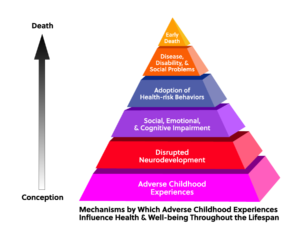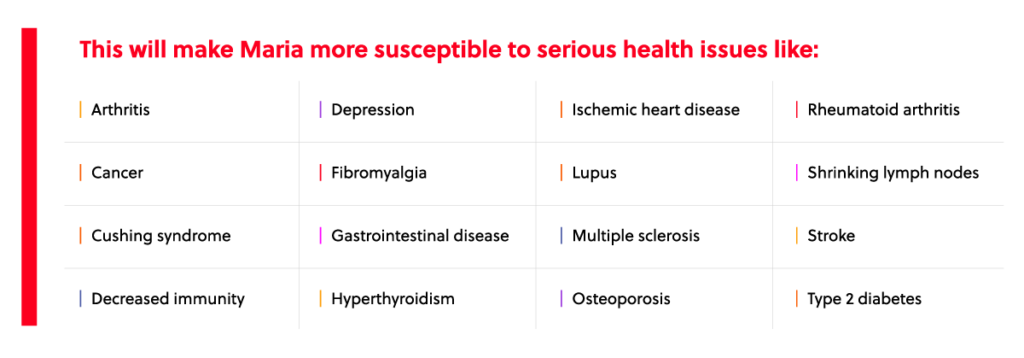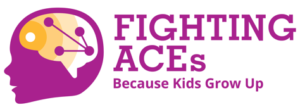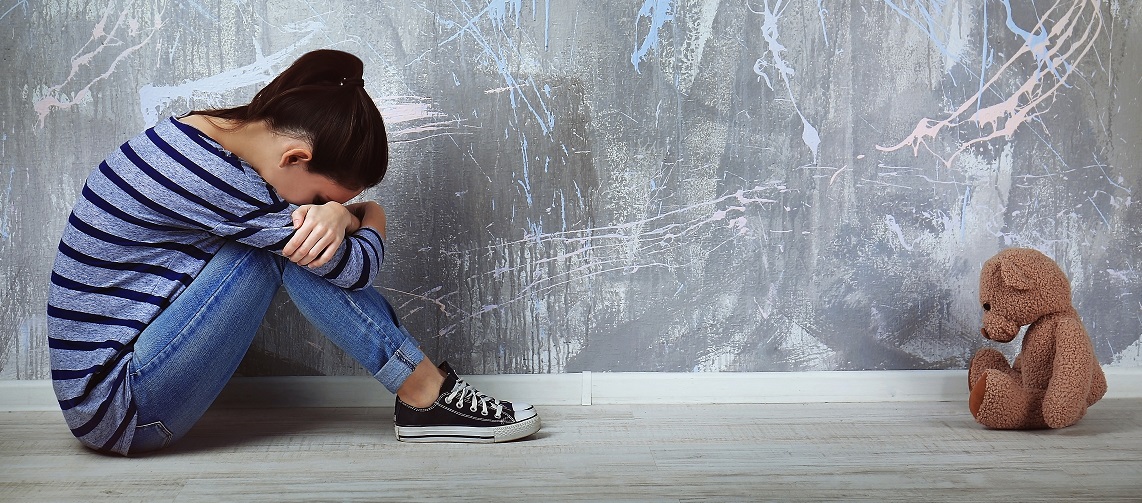Five-year-old Maria* saw her mother collapse during a severe asthma attack, then watched as an ambulance whisked her away for what would turn out to be several weeks of recuperation away from home. Maria was too young to understand what was happening. She just knew that suddenly, something was wrong with Mommy and she was taken away. Maria began having nightmares.
Without a buffer or an intervention from a trusted, positive influence to guide her and her family in the right direction, the negative effects of her ACEs could range from disrupting her neurological development to reducing her life expectancy by 20 years. Adverse events can traumatize the whole family. They are difficult to talk about rationally and constructively. But we must face the harsh reality of what happens when we – as a community – don’t discuss ACEs and how to fight them.
Adverse events can traumatize the whole family. They are difficult to talk about rationally and constructively. But we must face the harsh reality of what happens when we – as a community – don’t discuss ACEs and how to fight them.
Discussing the community’s role in ACEs is just as important as the actual trauma-informed therapy provided to children and families at places like the Center for Child Counseling. The impact of ACEs on the well-being and productivity of a community is enormous.
Long-term community costs
Communities have an obligation to keep children safe, but society has a vested interest in fighting ACEs that goes way beyond the moral imperative. Children who experience ACEs without receiving interventional care can have a dramatic effect on their communities in the form of higher healthcare costs, potentially higher crime rates, mental-health expenditures, and lost productivity.
Scientists have found clear distinctions between brain scans of people exposed to the chronic stress associated with ACEs and those who have not been exposed. Living with chronic stress is toxic, resulting in a smaller hippocampus, prefrontal cortex, and amygdala – areas of the brain responsible for self-regulation, decision-making, managing stress, and processing emotions, memory, and fear.
Simply put, the brains of children who experience abuse, neglect, and household dysfunction are structurally altered, threatening their ability to grow up to be productive, contributing members of society.
Of course, the behaviors associated with ACEs vary based on a child’s age and circumstances. From the outside, we see only the symptoms exhibited when something triggers a trauma reminder. These symptoms include but are not limited to:
- Withdrawing
- Refusing to comply with directions
- Jumping from 0-10 on the anger scale
- Having difficulty building trust in relationships
- Lacking control and/or impulsivity
In reality, most children are resilient. They carry on even after experiencing ACEs. Without early screening and intervention though, they’ll be heading down a dangerous road that involves ever-riskier behavior. When children are deprived of the security, love, and trust that make them feel safe (or good), they often choose to take risks later in life. When they are old enough to have access to things that make them feel safe or good, they may abuse them. This often includes unsafe sex with multiple partners and/or misusing drugs and alcohol.
However, the consequences of ACEs don’t stop there. As with all types of chronic stress, ACEs-induced stress takes its toll on the body as well as the mind.
Body + mind
As Maria grows into an adult who experiences chronic stress for years on end, her body will process adrenaline and cortisol at atypical rates. This will make her more susceptible to serious health issues like:
 Our mental health and physical health are intertwined, so it’s not surprising that ACEs can have serious physical consequences – ultimately leading to an early death.
Our mental health and physical health are intertwined, so it’s not surprising that ACEs can have serious physical consequences – ultimately leading to an early death.
For all these reasons, it’s imperative that communities like ours address ACEs through open and honest dialogue. There is hope. Soon after witnessing her mother’s collapse, Maria underwent three months of play therapy at the Center for Child Counseling. Trained counselors help children like Maria every day to express and work through their confusing, negative feelings rather than keep them inside where they can do lasting damage.
Children like Maria can heal after trauma, but only if the adults around them are willing to fight on their behalf.
The Center for Child Counseling provides healing care to more than 2,500 children each year. Interested in learning how you can help fight childhood adversity in your community? Sign up below to learn more through our ongoing educational blog series.

Sign up now for news, events, and education about Adverse Childhood Experiences (ACEs) and promoting resilience.
By submitting this form, you are consenting to receive emails from: Center for Child Counseling, 8895 N. Military Trail, Palm Beach Gardens, FL, 33410. You can revoke your consent to receive emails at any time by using the SafeUnsubscribe® link, found at the bottom of every email.

